The 15 Best Body Sunscreens to Match Your Every SPF Need
Sayonara, sunburns.

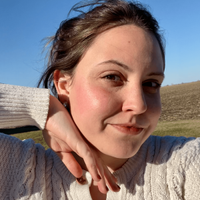
It's unfortunate that sunscreen (perhaps the most important beauty product?) has so many myths surrounding it. The best body sunscreens won't prevent you from tanning (note: self-tanners are great for getting a perfectly bronzed look) and they don't only exist to prevent sunburn. In fact, the best new sunscreens go a step further—they're your number one line of defense against skin cancer, hyperpigmentation, and long term sun damage.
"The skin on our body can age more rapidly than our face due to structural differences, often requiring more treatments to achieve the same results with the same anti-aging procedures," explains Dr. Nicole Y Lee, M.D. MPH FAAD, a board-certified dermatologist and owner of Epoch Dermatology. "Protecting the skin from head to toe with sunscreen is the easiest and simplest thing that we can do to slow down the aging process and to maintain healthy, youthful skin."
But in order to actually get the protection, SPF application can’t be done haphazardly. “We typically tell people the appropriate amount of sunscreen is roughly what you would fill a shot glass with,” explains Dr. Robert Finney, M.D. board-certified dermatologist at Entiére Dermatology. “Many people are good about applying sunscreen at the outset of a beach day, but slack off on reapplying every two hours or sooner if you sweat or swim.”
Sound familiar? Keep reading for a list of the best body sunscreens you’ll want to reapply all day long—tested by our editors over many long beach, pool, lake, and desert camping trips. From gels with a little shimmer and sprays with no white cast to mineral and chemical sunscreens that feel weightless, these SPFs all deserve a spot in your bag.
The Best Body Sunscreens
- The Best Body Sunscreen Overall: EltaMD UV Aox Mist Broad-Spectrum SPF 40
- The Best Body Sunscreen Oil: Vacation Shimmer Oil SPF 30 Sunscreen
- The Best Body Sunscreen For a Subtle Shimmer: Supergoop! Glowscreen Body Sunscreen SPF 40
- The Best Spray Body Sunscreen: MDSolarSciences Quick Dry Body Spray SPF 40
- The Best Dual Face and Body Sunscreen: CeraVe Hydrating Sheer Sunscreen Face and Body Lotion with SPF 30
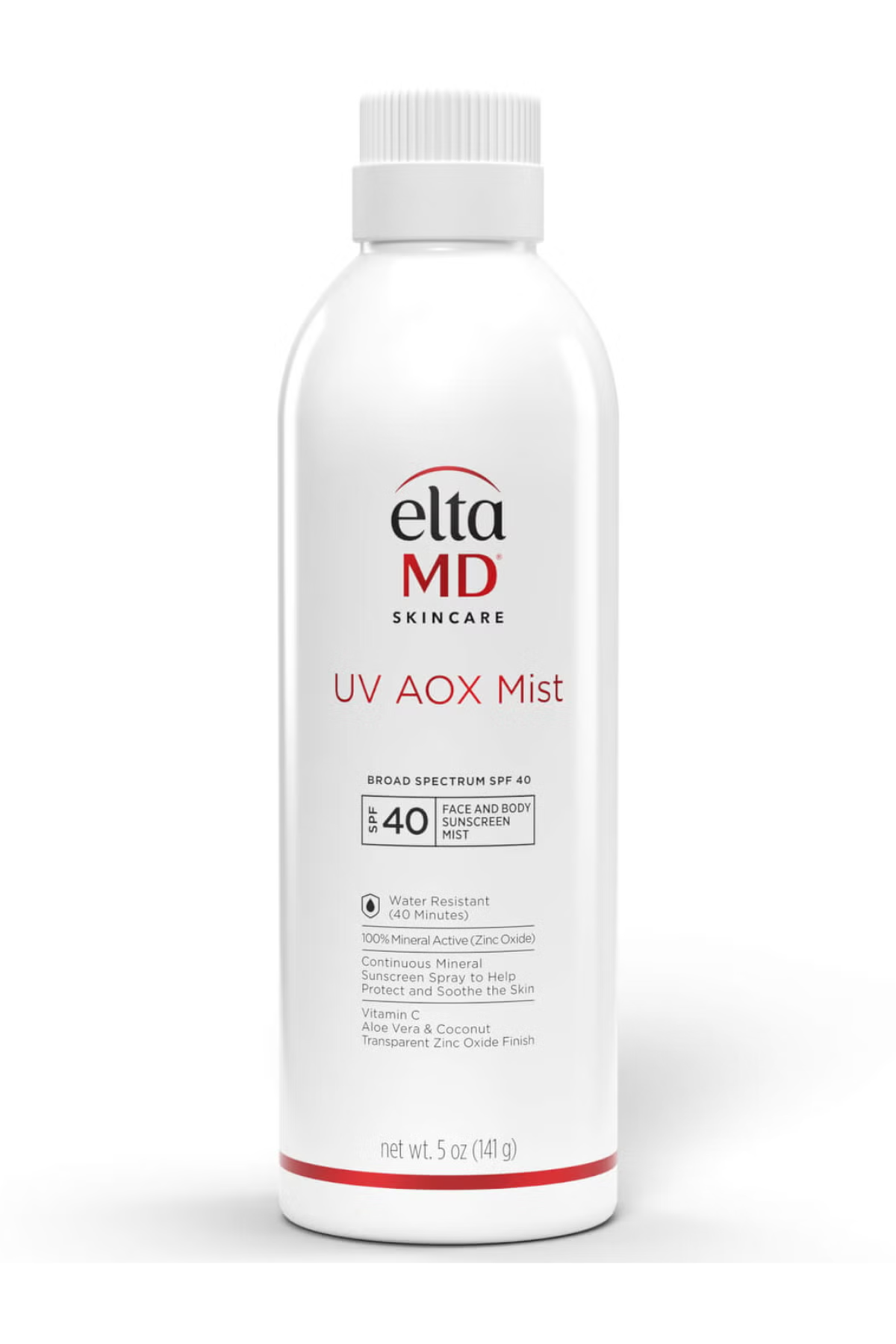
When spraying this sunscreen, you might be shocked at its white appearance. But don't worry—it's designed this way so you can see exactly where you've applied it. Once it's rubbed in, it's virtually undetectable.
This Elta MD option offers protection for 40 minutes—just make sure to reapply. The texture is a pleasant surprise, as it feels extremely lightweight, almost like it disappears into your skin. Despite being a zinc oxide-based sunscreen , it doesn't feel heavy or greasy, leaving your skin feeling soft and comfortable.
Dr. Lee and Dr. Turner are also fans. "I particularly love the Aox Mist because it is not a traditional spritz, but a lotion that comes out as a spray for ease of application and rubs in completely sheer, avoiding any missed spots," explains Dr. Lee, while Dr. Turner adds that it's "gentle enough to be used on both the body and the face; it contains skin-hydrating ingredients like aloe, glycerin, and coconut fruit extract as well as free radical scavengers vitamin C and E." Still, he advises you not to skimp on the amount you use, as you have to ensure enough coverage to get the full SPF rating.
SPF: 40
Type: Hybrid sunscreen
Active Ingredients: Zinc oxide, octinoxate
Water Resistant: Yes, up to 40 minutes
Size: 5 oz.
Pros: Expert recommended; Easy to apply; Extremely lightweight; Leaves skin feeling soft; Hydrating
Cons: None found
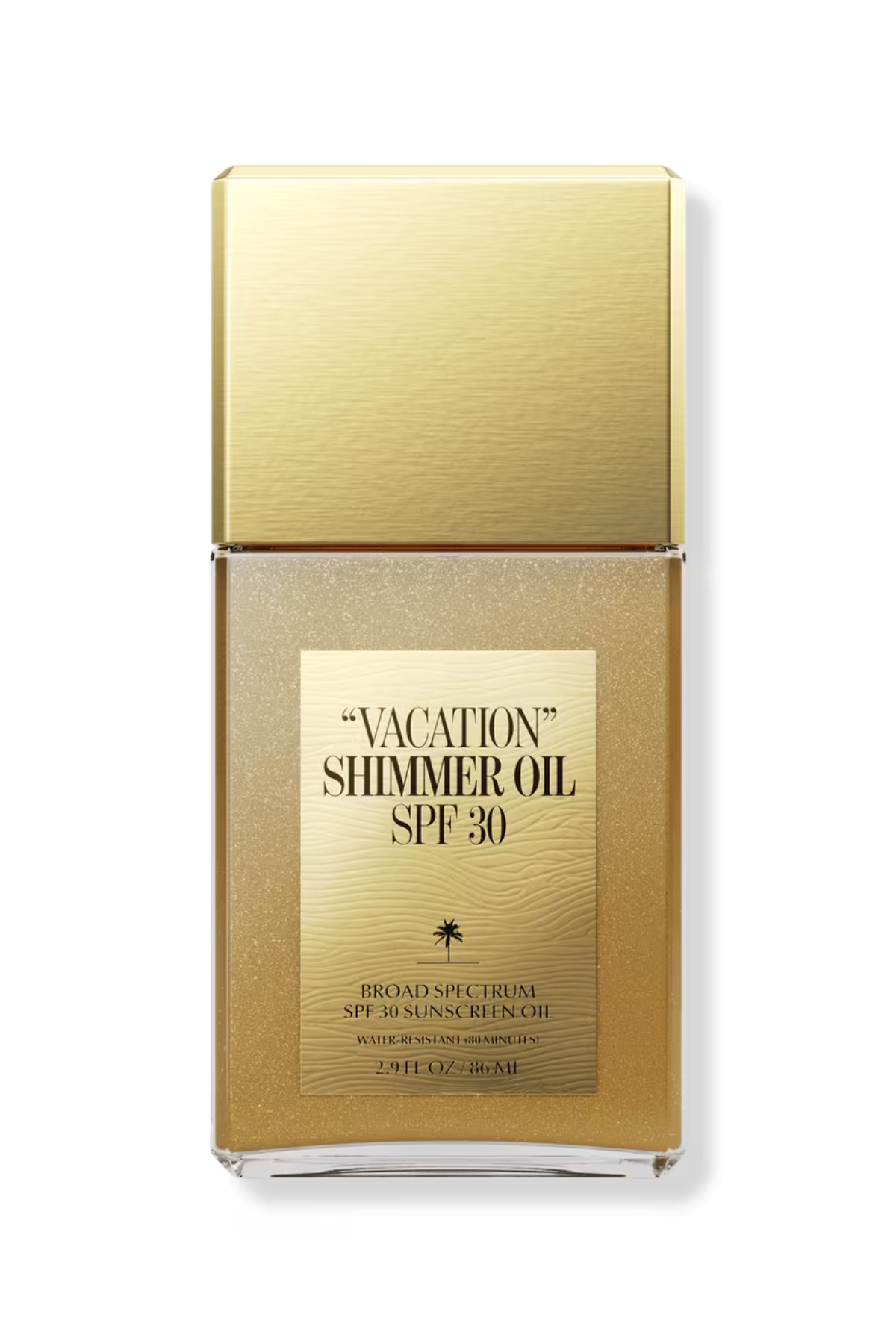
Some tanning oils have questionable sun protection, but not this luxe new sunscreen oil. With a silky, smooth consistency and skincare-ingredient-infused formula that induces a glow without you having to step foot in the sun—it includes two types of shimmer, a pearlescent glaze, and reflective gold flecks—this SPF is a winner on all accounts. I've never particularly liked applying sunscreen, but this silky formula is a delight to rub all over.
SPF: 30
Type: Chemical sunscreen
Active Ingredients: Avobenzone, homosalate, octocrylene
Water Resistant: Yes, up to 80 minutes
Size: 2.9 oz.
Pros: Provides a glow; Luxe texture; Dermatologist tested; Includes skincare ingredients like hyaluronic acid, peptides, and vitamin E
Cons: SPF could be higher
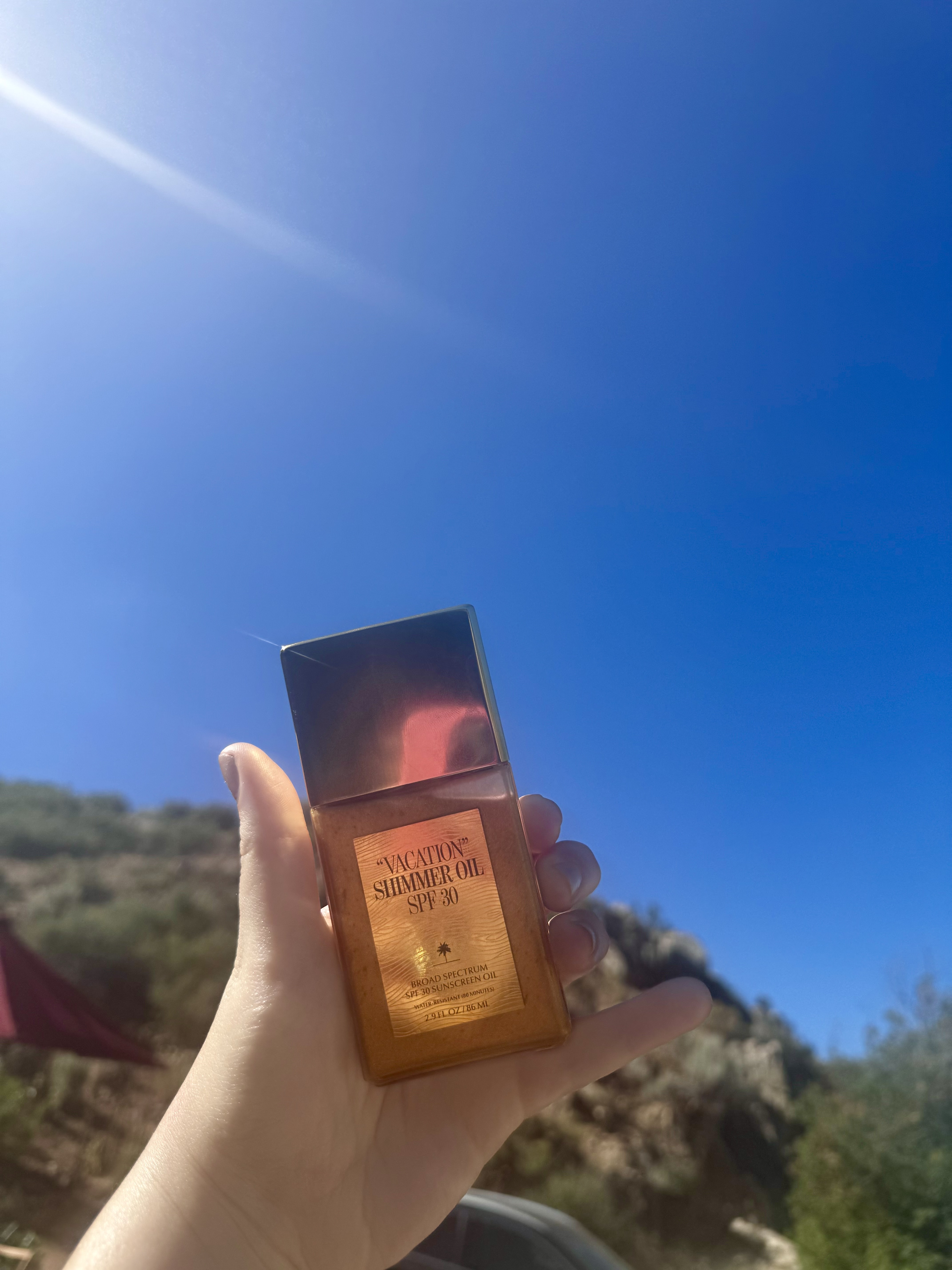
Vacation's Shimmer Oil shimmering in the Southern California desert.
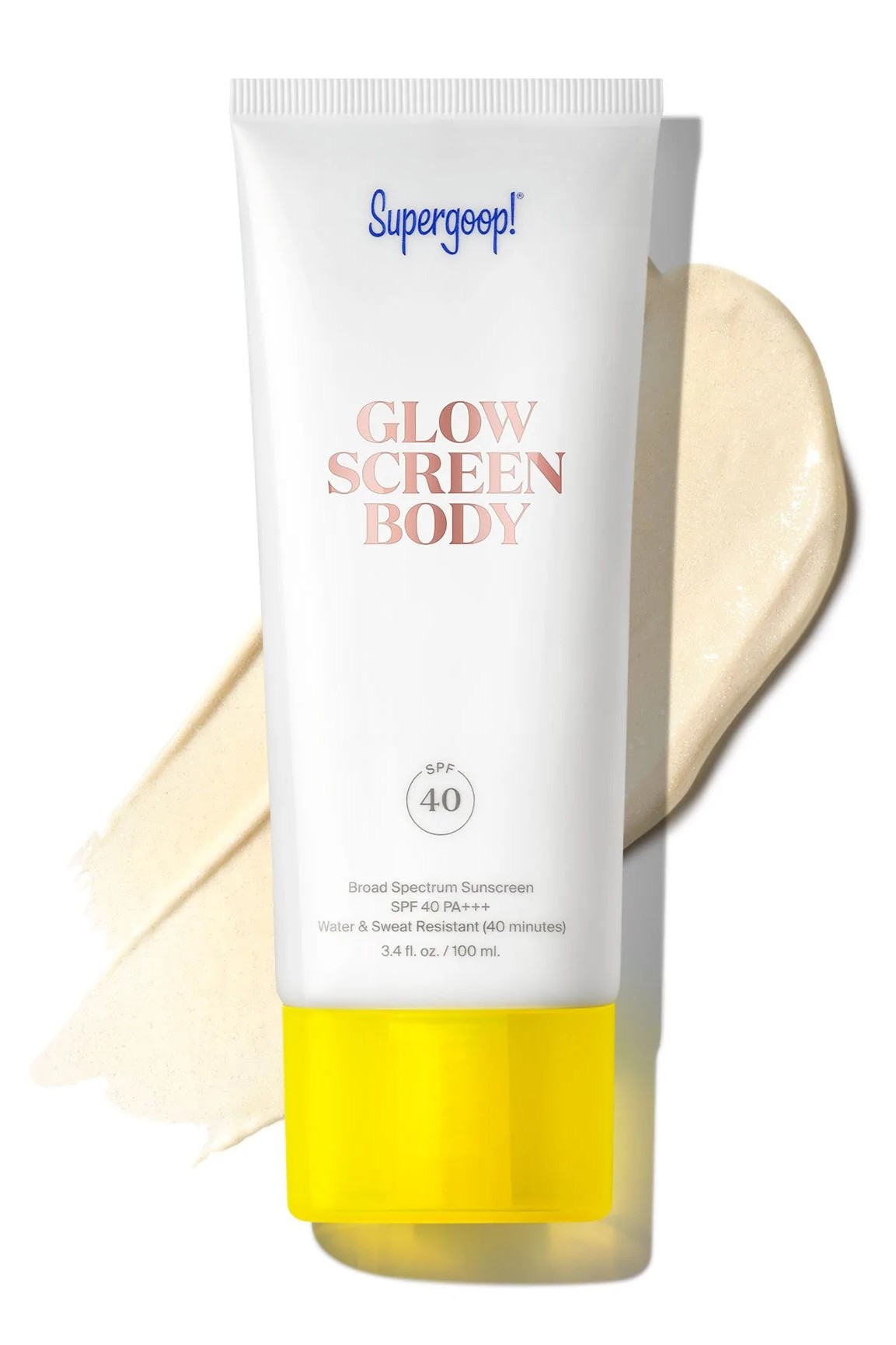
The OG Supergoop! Glowscreen is one of our longtime faves for the face, so it’s no surprise that the body version is also a summer staple. It has a whipped texture (read: light and fluffy without feeling sticky) that absorbed into my skin in seconds and left behind a gorgeous shimmer. While this is obviously a must for a beach day, it’s also a great way to get a little body glow for a night out—it's as pretty shining in the sun as it is under fluorescent lights at your post-lake Dairy Queen stop. (P.S.—If you're looking for an option with a higher SPF, Supergoop!'s Play sunscreen is also a great choice, albeit without the added glow.)
SPF: 40
Type: Chemical sunscreen
Active Ingredients: Avobenzone, homosalate, octisalate, octocrylene
Water Resistant: Yes, up to 40 minutes
Size: 3.4 oz.
Pros: Leaves behind a gorgeous shimmer; Blends nicely; Non-sticky formula
Cons: Lower SPF rating than other options; More expensive than other options
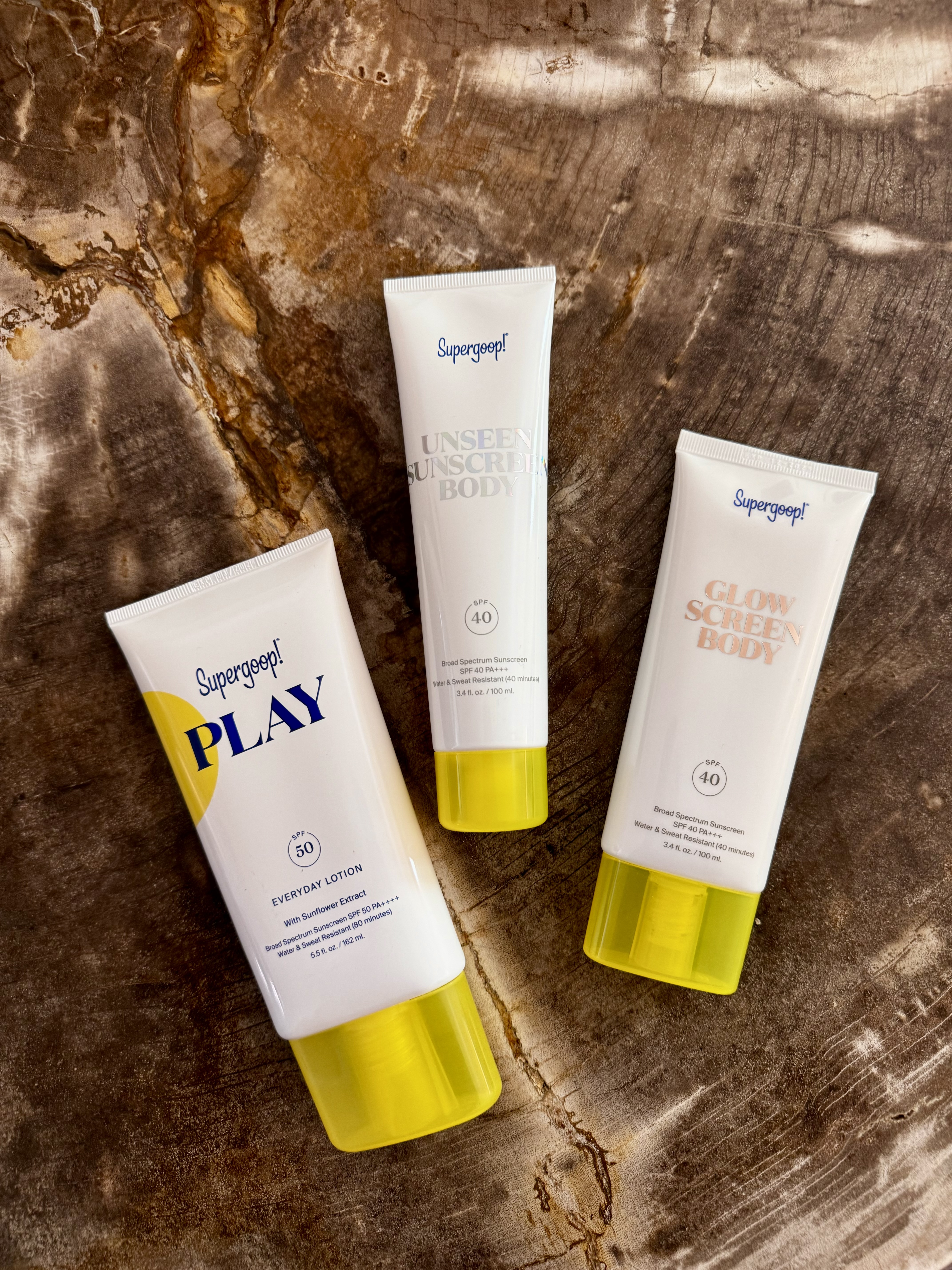
Our Supergoop! testing lineup. While all great in their own way, Glow Screen Body was the favorite of the bunch.
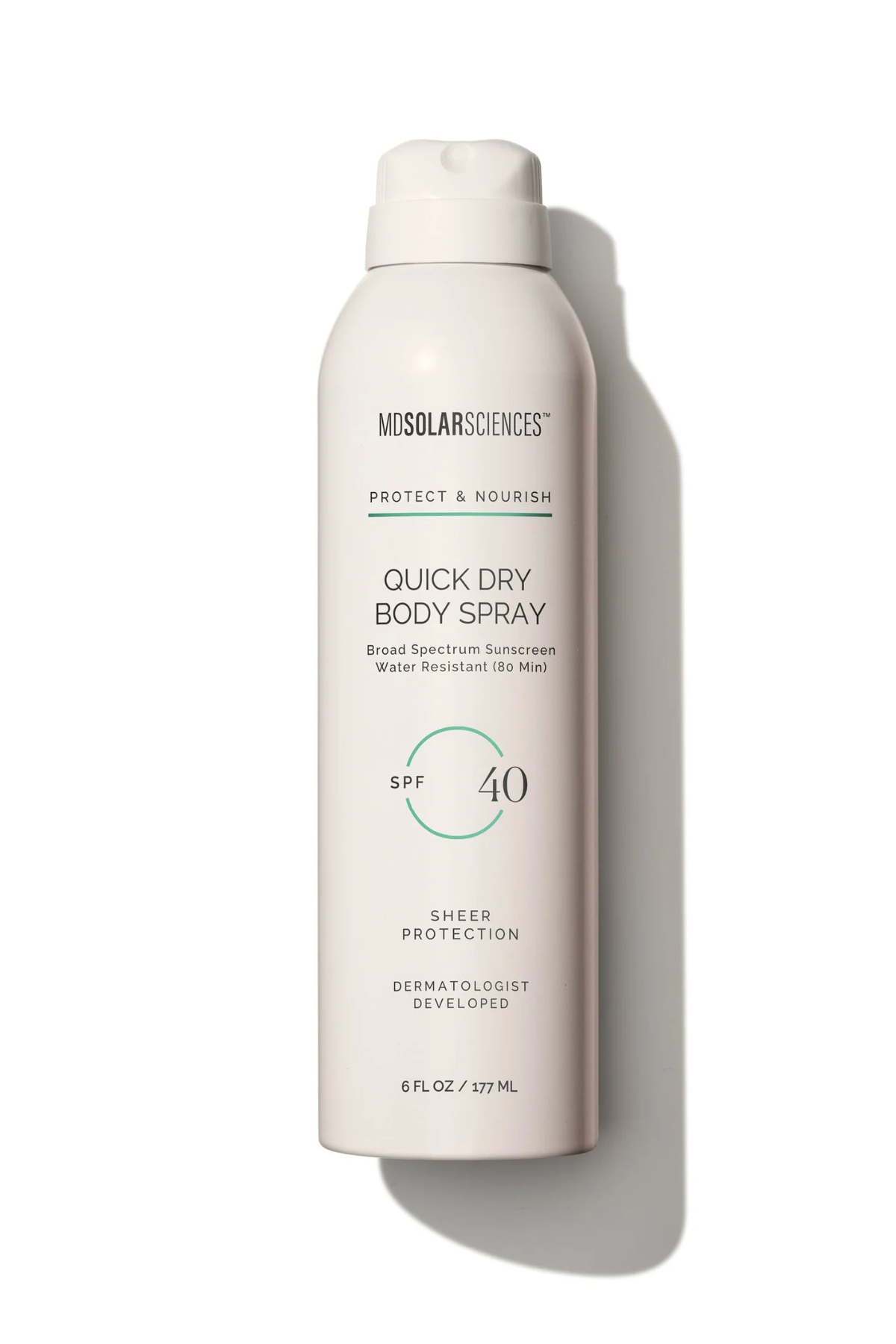
Sometimes a spray sunscreen is just easier. Because let’s be honest: There’s nothing more irritating than trying to rub on a cream with sandy hands. After a couple tests, this one has become my spray-and-go go-to. It’s dry to the touch so quickly after application (it’s not sticky in the slightest) and is packed with antioxidants like vitamin C and gooseberry to further protect your precious skin. It's also water resistant and uses a non-aerosol spray system—you're welcome, planet.
SPF: 50
Type: Chemical sunscreen
Active Ingredients: Avobenzone, octisalate, octocrylene
Water Resistant: Yes, up to 80 minutes
Size: 6 oz.
Pros: Easy to use; Dries quickly; Water resistant for up to 80 minutes
Cons: None found
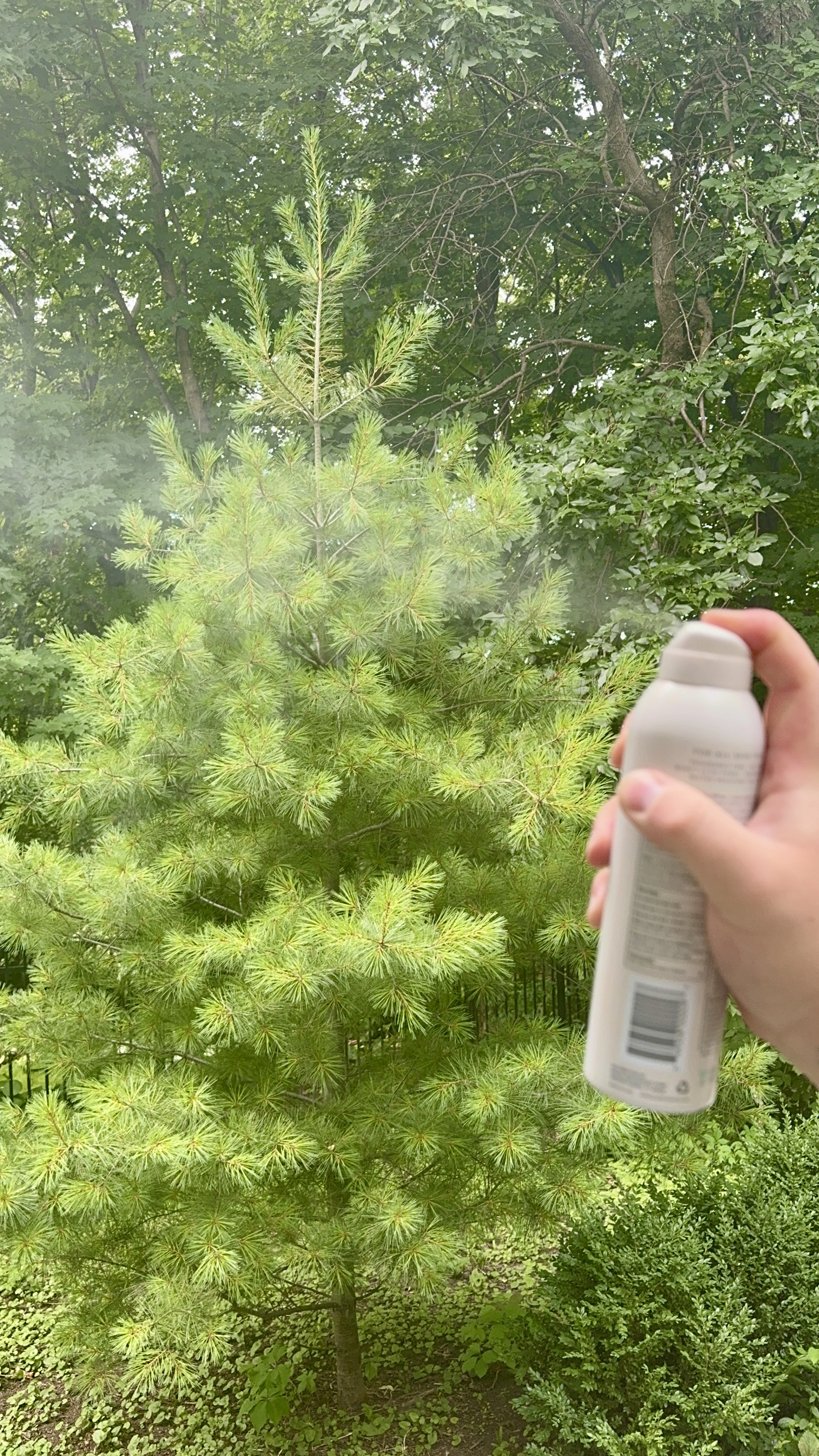
MDSolarSciences Quick Dry Body Spray in action.
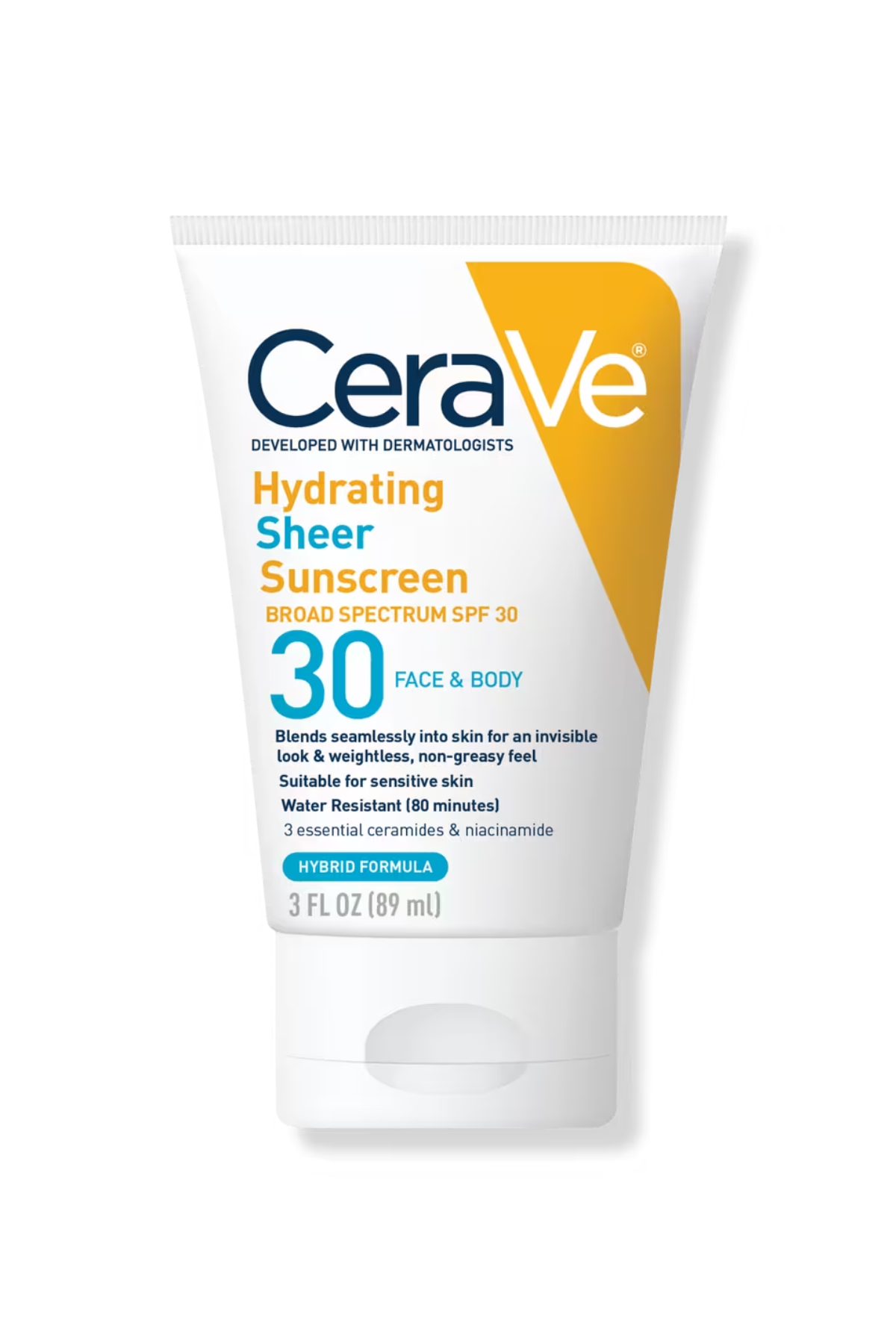
Dr. Turner is all about this sunscreen for many reasons, the first of which is its dual purpose. "I love this product because it’s both a face and body formula, is easily found at the drugstore, is budget-friendly, water resistant, and is a hybrid mineral/chemical sunscreen," he explains. "Hybrid formulas tend to be very cosmetically elegant—they’re not heavy, stiff, or chalky like mineral formulas, but not greasy or as likely to irritate the skin as chemical formulas. This product, in particular, is also very hydrating and comfortable on the skin; it contains a blend of nourishing ceramides, hydrating hyaluronic acid, and soothing, skin-balancing niacinamide."
SPF: 30
Type: Hybrid sunscreen
Active Ingredients: Homosalate, octisalate, octocrylene, titanium dioxide
Water Resistant: Yes, up to 80 minutes
Size: 3 oz.
Pros: Dermatologist recommended; Dual-purpose formula; Affordable; Non-comedogenic; Allergy-tested; Ophthalmologist-tested; Recommended by the Skin Cancer Foundation for Active Use
Cons: Some wish it came in a larger bottle
Also Recommended
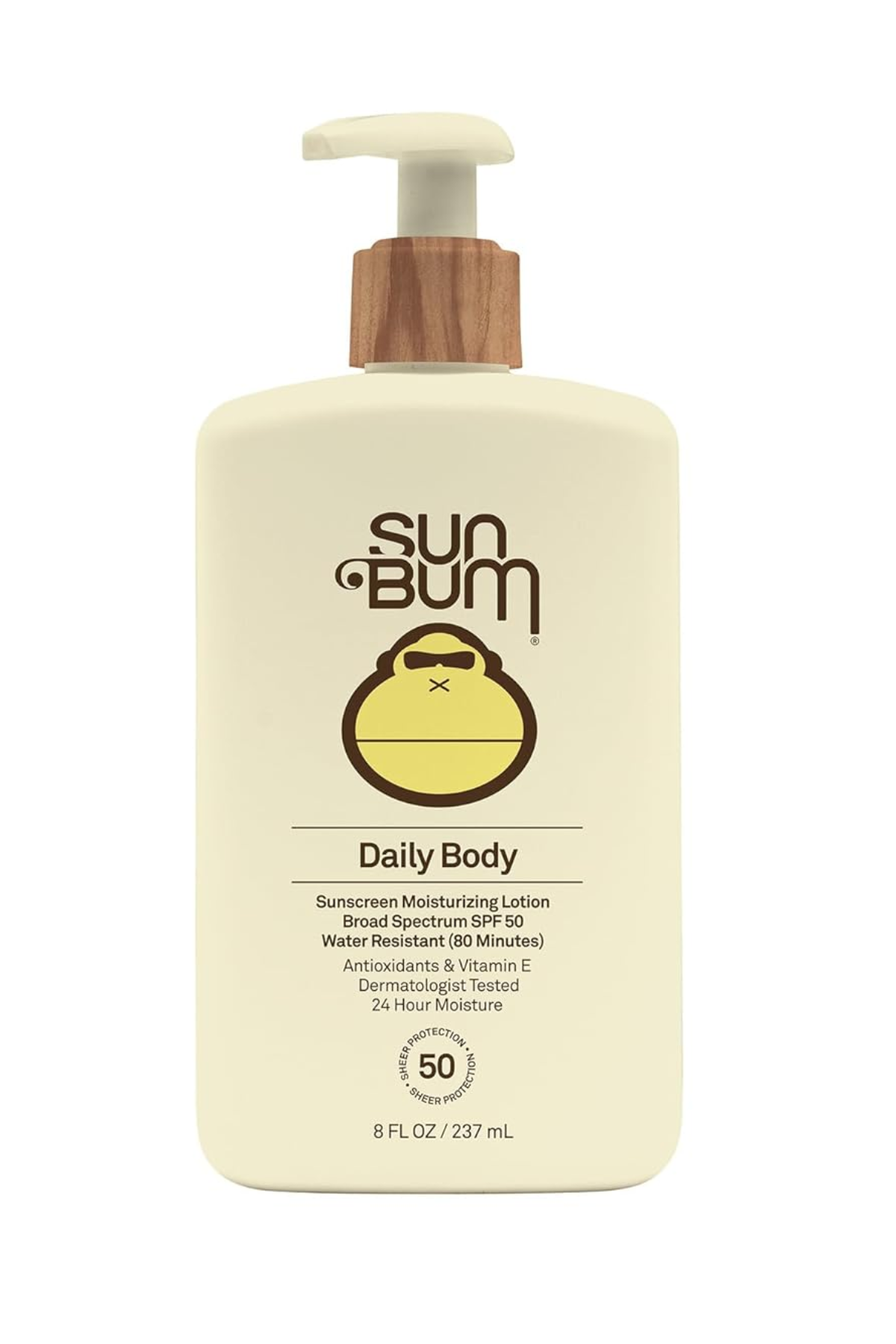
I first tested this sunscreen during a trip to Hawaii earlier this year, and it's been a staple ever since. I especially love the big pump bottle that can sit right on my dresser, so I always remember to apply it. Sun Bum's great daily collection (I love the gel on a warm, summer day) was created for this very purpose: to provide ultra-lightweight, ultra-hydrating formulas with built-in SPF so you're always wearing sunscreen. I've had zero problems: it smells nice, blends even nicer, and, again, that pump bottle is the best.
SPF: 50
Type: Chemical sunscreen
Active Ingredients: Avobenzone, homosalate, octisalate, octocrylene
Water Resistant: Yes, up to 80 minutes
Size: 8 oz.
Pros: Pump bottle makes it easy and convenient to use; Affordable; Lightweight formula; Dermatologist tested
Cons: None found
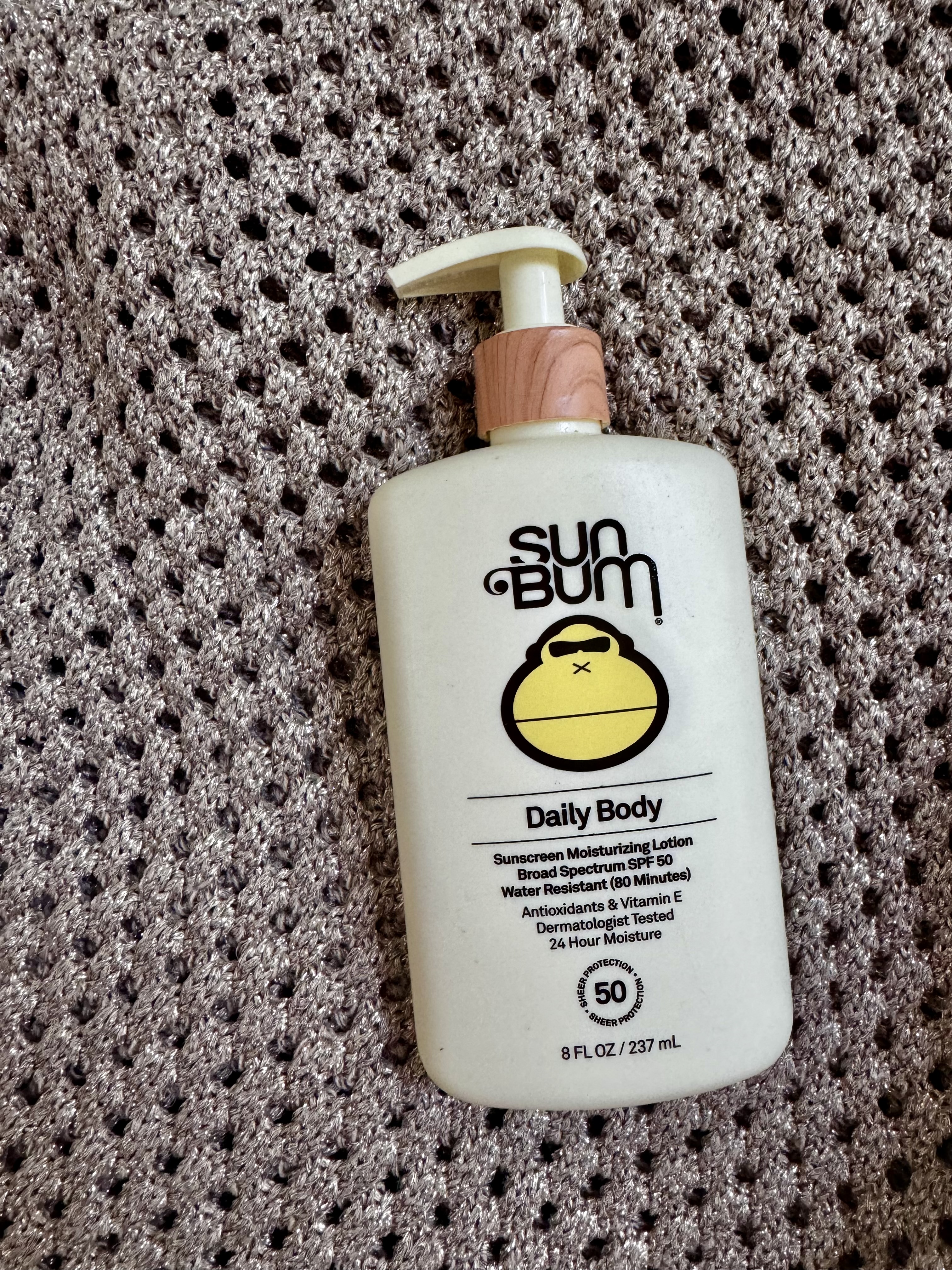
Sun Bum's Daily Body sunscreen photographed with a glittery swimsuit coverup—both necessities during a tropical vacation.
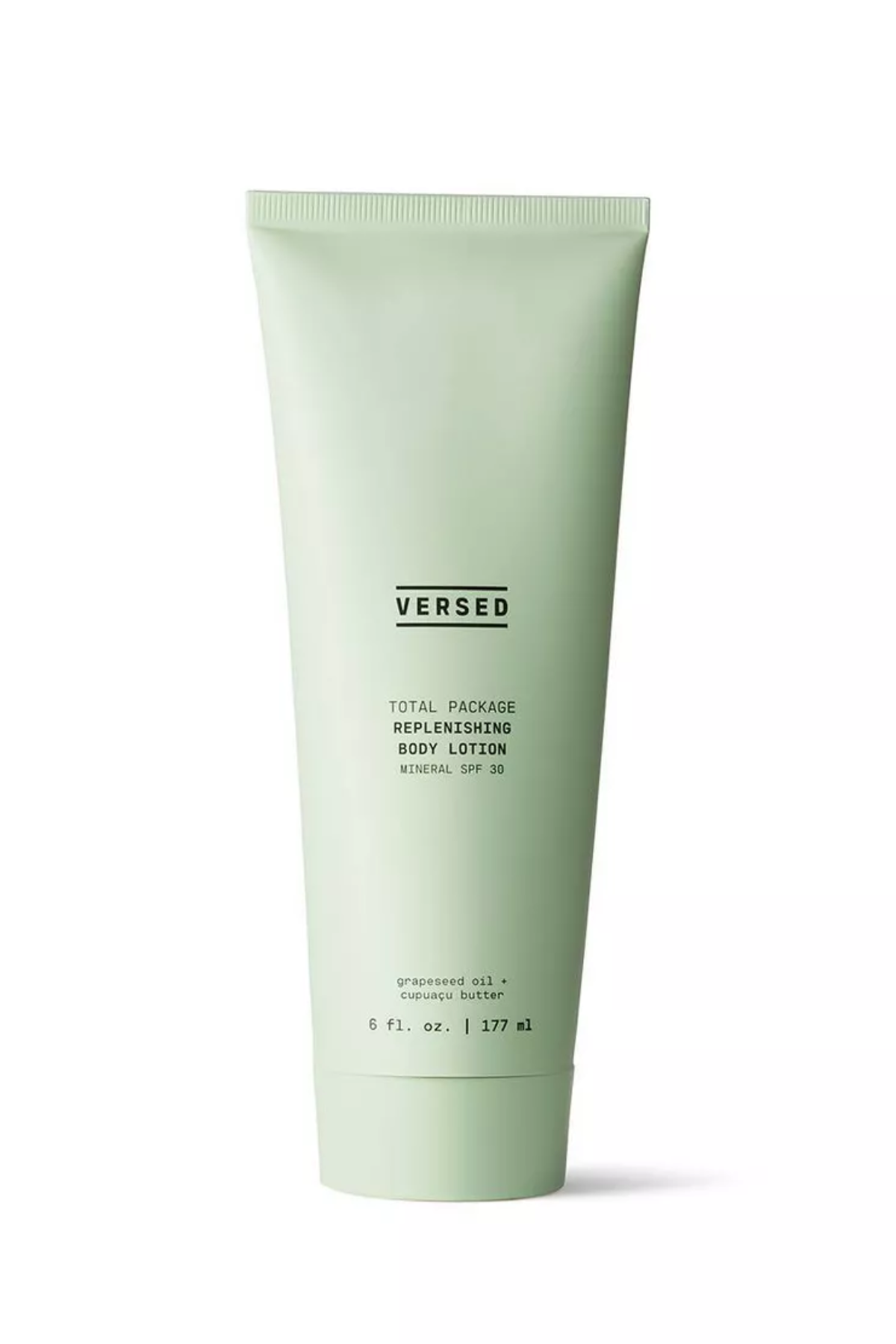
If flaky, dry skin is your status quo in the summer, it’s time to incorporate some mega hydration. Our go-to? This Versed body lotion—which doubles as a sunscreen. The grapeseed oil-infused formula provides antioxidant protection, and the cupuaçu butter intensely hydrates the skin. Add the SPF 30 into the mix (a lovely rating compared to what we see in most moisturizers with SPF), and you’ve hit the trifecta.
SPF: 30
Type: Mineral sunscreen
Active Ingredients: Zinc oxide
Water Resistant: No
Size: 6 oz.
Pros: Moisturizing; Dermatologist tested, Sensitive skin-friendly
Cons: None found
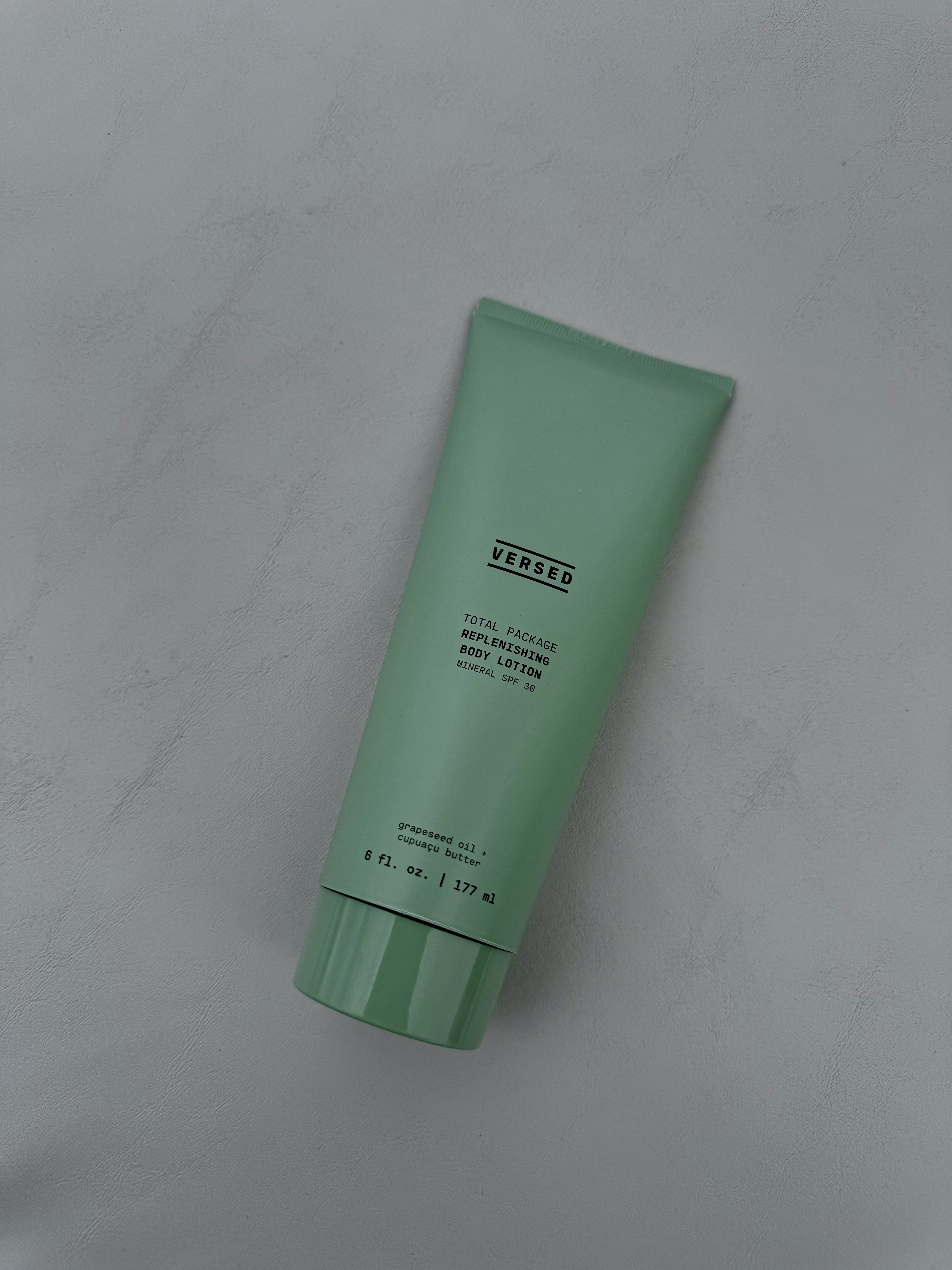
A bottle of Versed Total Package Replenishing Body Lotion resting on a pontoon sundeck. Great for when your skin is feeling a bit dry after toweling off lake water.
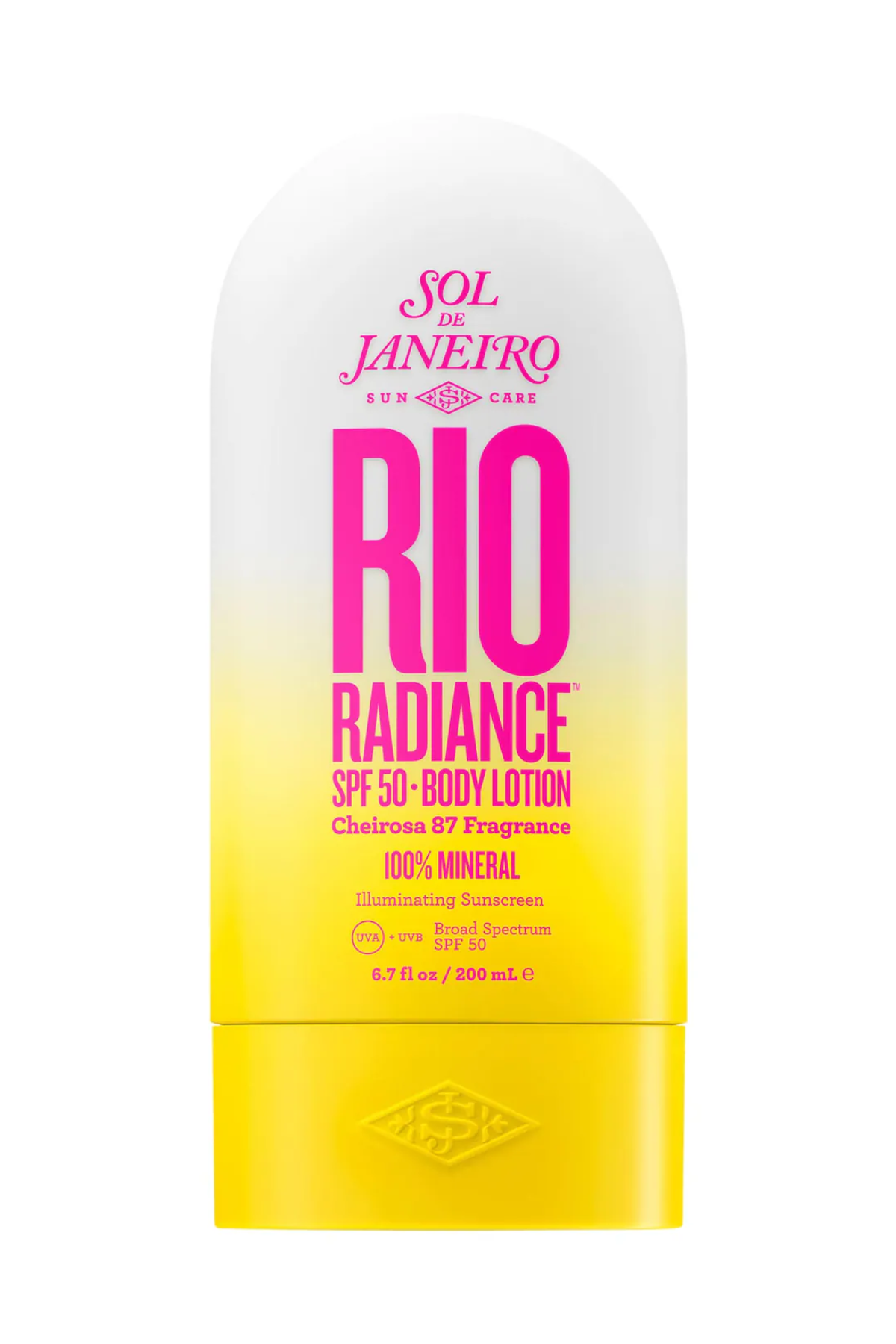
Sol de Janeiro is famous for its great-smelling body products, and its new SPF line does not disappoint. Scented with their Cheirosa 87 fragrance—it has top notes of leite de coco and warm sand, middle notes of solar tuberose and ylang-ylang, and dry notes of creamy vanilla and amber essence—this is the sunscreen for you if you're planning on making SPF part of your essence. For any other, I'd suggest pairing it with a light perfume.
SPF: 50
Type: Mineral sunscreen
Active Ingredients: Zinc oxide
Water Resistant: No
Size: 6.7 oz.
Pros: Smells great; Moisturizing; Blends nicely; Also available in an oil and spray format
Cons: None found
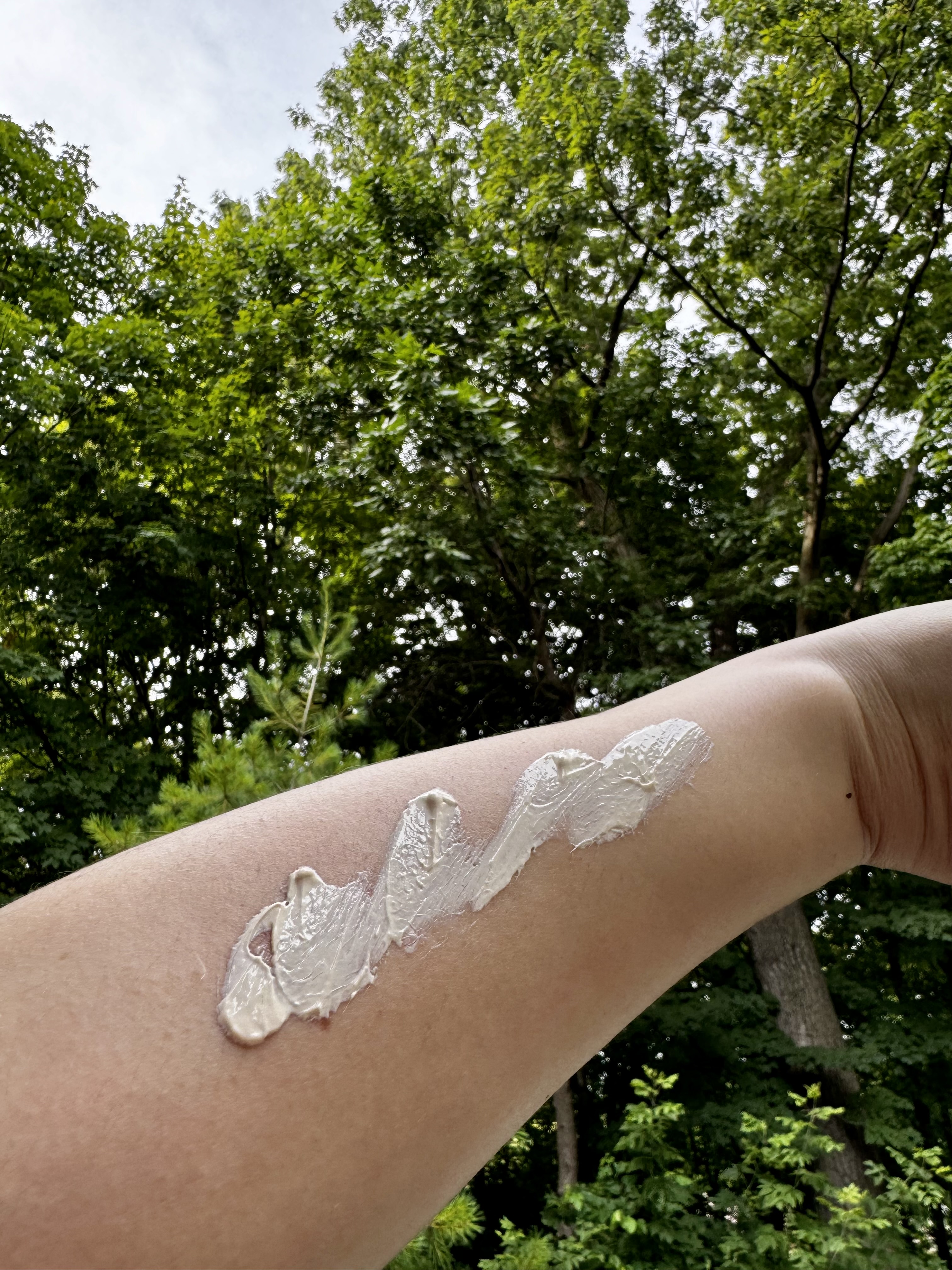
A lovely smear of Sol de Janeiro's Rio Radiance SPF 50 Mineral Body Lotion Sunscreen lotion. (It smells better than it photographs, promise.)
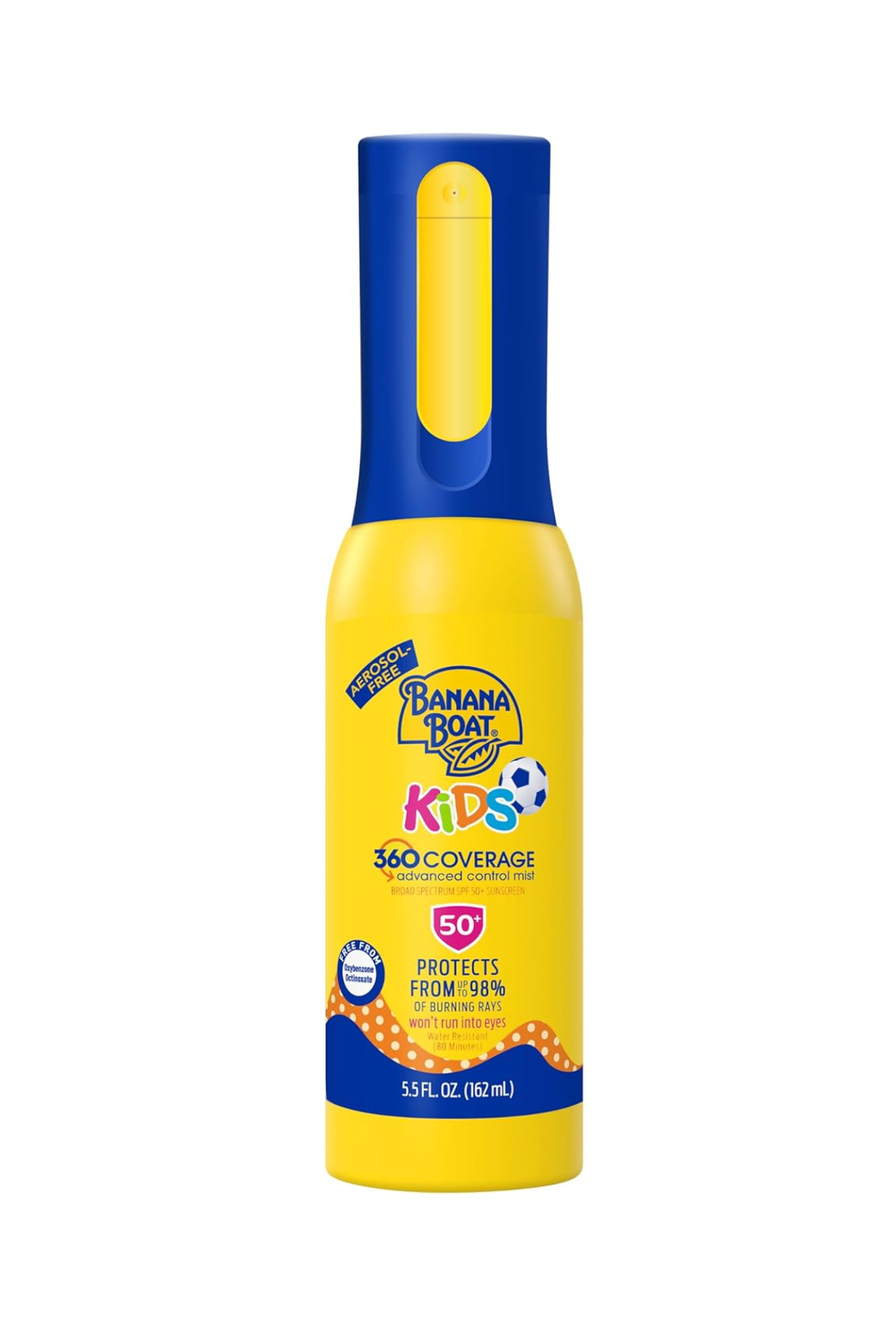
I don't have kids, but my friends do! So I asked them what SPFs their babies love this year and tried them myself. It's also worth noting that I sometimes feel like a kid trying to run away and jump in the pool when it's time to apply sunscreen. Banana Boat's new Kids 360 Coverage Sunscreen Mist SPF 50+ features an easy-to-use, refillable (!) mister for easy and accurate coverage. I love how fine the mist is, and the super blendable, unscented, serum-like formula is also fab. I could cover my whole body in virtually no time, and—even though I was self-applicating—didn't catch any missed/burnt areas when my time in the sun ended.
SPF: 50
Type: Chemical sunscreen
Active Ingredients: Avobenzone, homosalate, octisalate, octocrylene
Water Resistant: Yes, up to 80 minutes
Size: 5.5 oz.
Pros: New non-aerosol can is convenient and well functioning; Refillable; Tear-free and sting-free formula; Affordable; Pediatrician tested
Cons: None found

Banana Boat's great non-aerosol spray bottle in action.
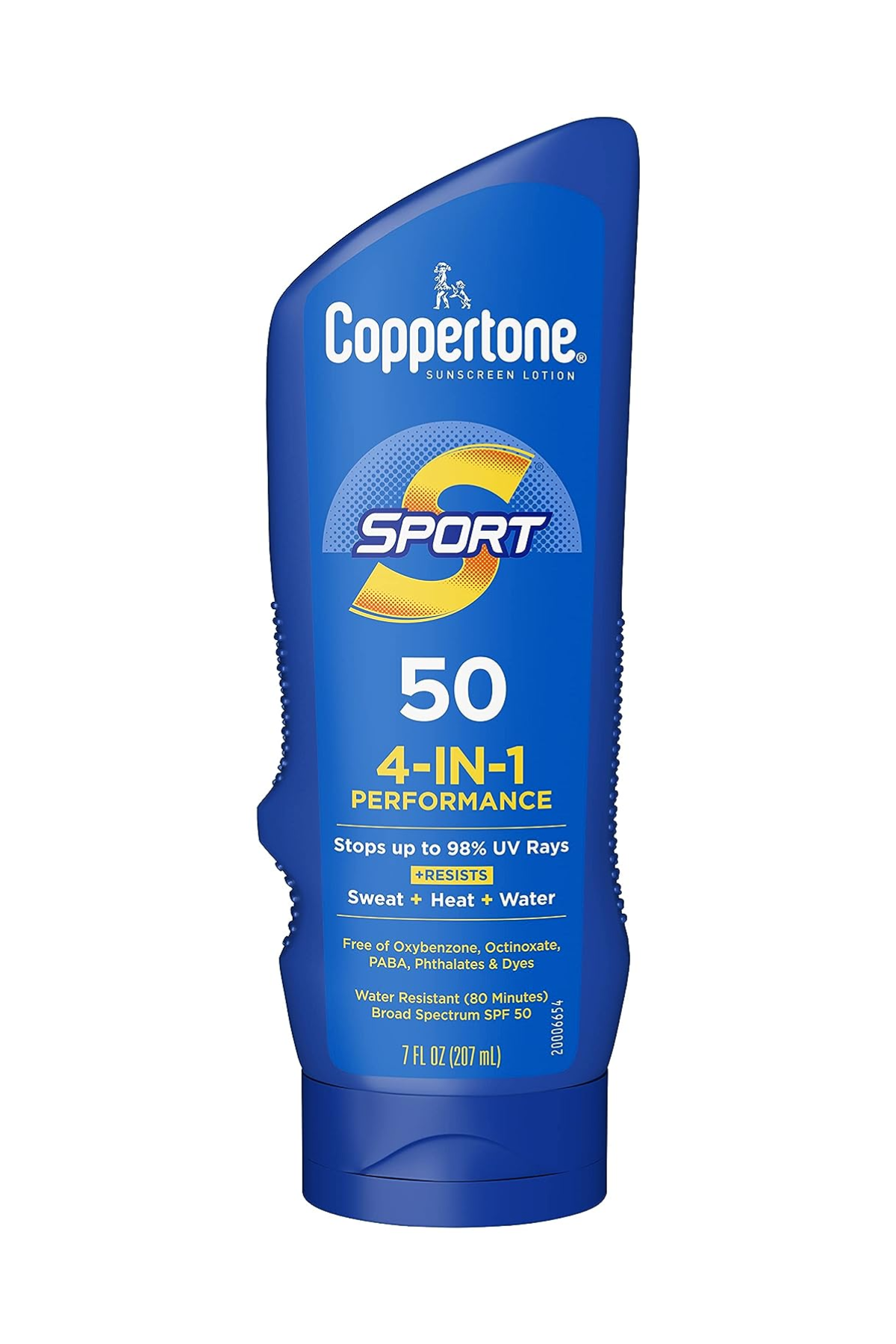
Whenever I'm at a Target (or any drugstore), I see shelves full of this stuff. It's also a staple in my household—if I ask for some SPF, I'll probably be given this blue bottle. An incredibly straightforward product, Sport blends nicely, leaves no white cast, and smells...like sunscreen, which is a good thing! If you ask me, anyway.
SPF: 50
Type: Chemical sunscreen
Active Ingredients: Avobenzone, homosalate, octisalate, octocrylene
Water Resistant: Yes, up to 80 minutes
Size: 7 oz.
Pros: Easy to find; Comes in a large bottle that'll last you a bit longer than others
Cons: None found
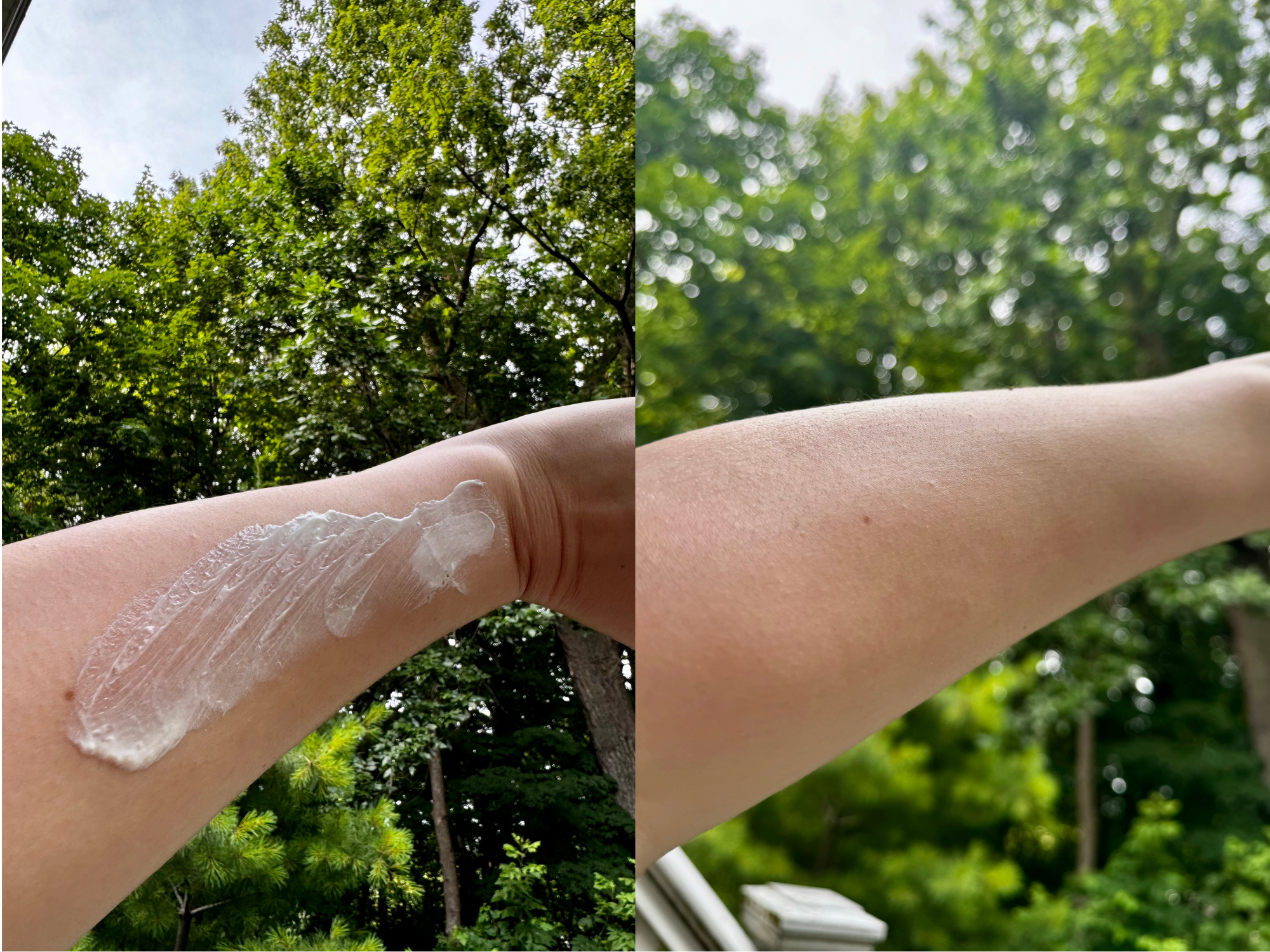
Coppertone Sport sunscreen before and after being rubbed in.
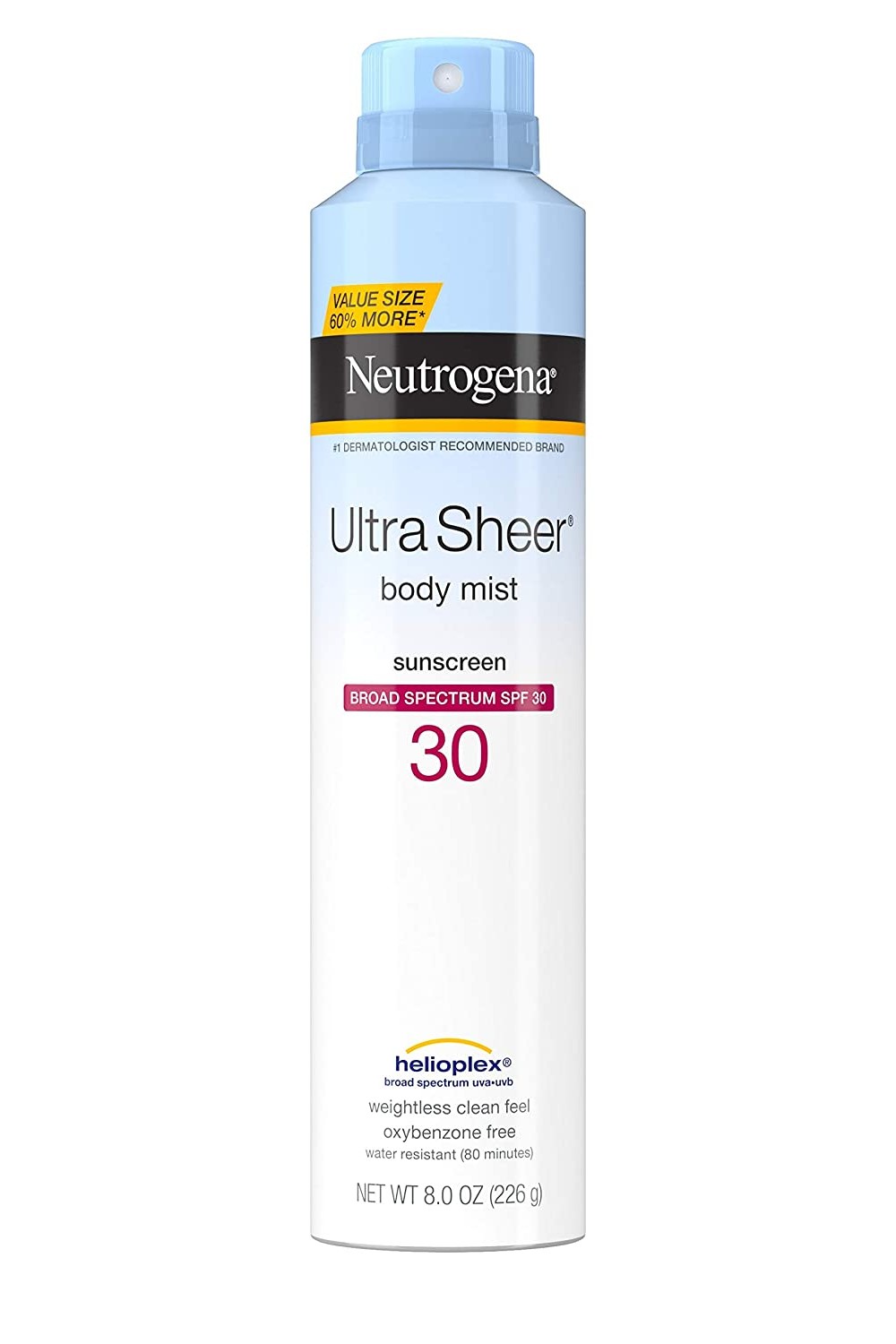
When I first applied this Neutrogena cult favorite—and for the hour and a half afterward—it felt virtually non-existent on my skin. It's also ideal for acne-prone and oily skin and, in my humble opinion, smells like the epitome of summer. Another pro (at this unbeatable drugstore price) is that it's entirely safe for use on your face.
SPF: 30
Type: Chemical sunscreen
Active Ingredients: Avobenzone, homosalate, octisalate, octocrylene, oxybenzone
Water Resistant: Yes, up to 80 minutes
Size: 5 oz.
Pros: Easy to apply; Affordable price; Safe for oily and acne-prone skin; Smells great
Cons: SPF could be higher
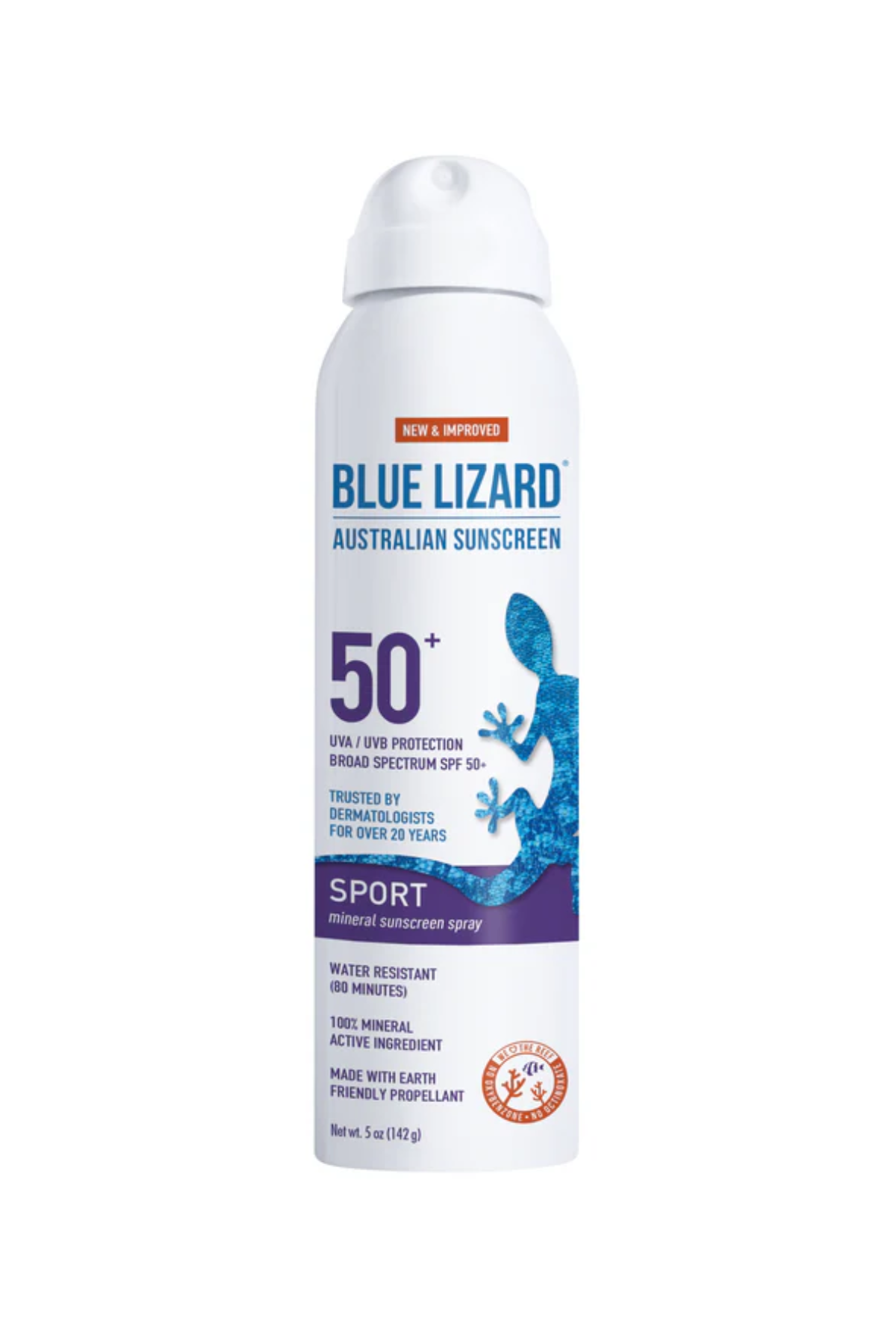
Marie Claire contributing syndications editor Katherine J Igoe names Blue Lizard Sport Mineral-Based Sunscreen her all-time favorite for a good reason. She's tested it time and time again, and it's always a winner. "I love, love, love this sunscreen—and I’m tough to shop for with my sensitive skin," she says. "It’s mineral and reef-friendly, it’s 50+, and it’s spray-on without giving me an intense white cast: all must-haves for me. If I spray it from a foot away, it’s got a powerful dispersal for good coverage, even on squirmy toddlers. If I spray it from a few inches (into my hands, for example, to rub it directly onto faces and ears), I get a little pool of sunscreen that dissolves quickly and easily."
SPF: 50+
Type: Mineral sunscreen
Active Ingredients: Zinc oxide, titanium dioxide
Water Resistant: Yes, up to 80 minutes
Size: 5 oz.
Pros: High SPF rating; Easy to apply; Dermatologist recommended; Safe for all skin types, including sensitive skin; No added fragrance
Cons: None found
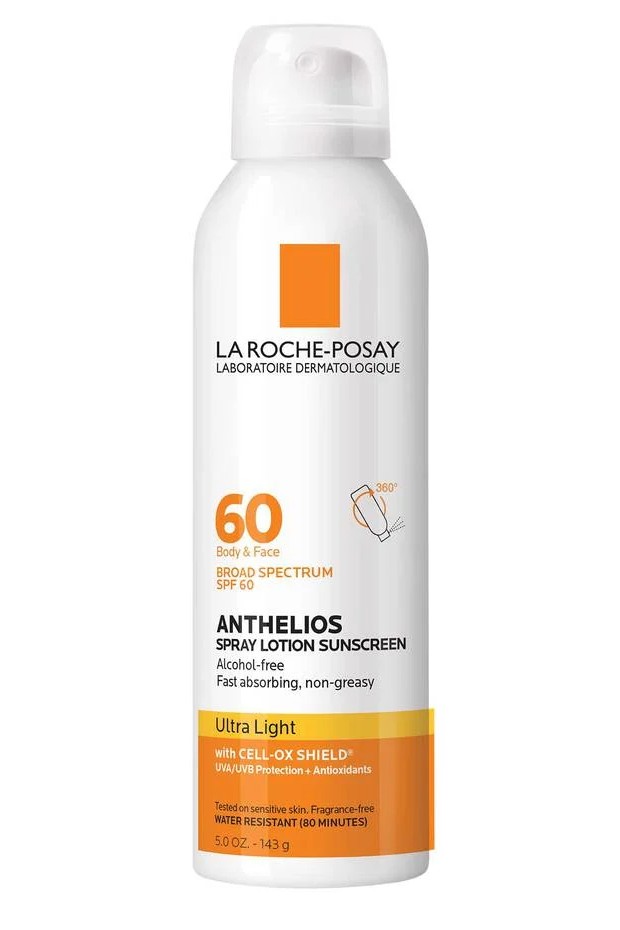
Is your skin easily irritated? Allow us to direct your attention to this highly rated and personally beloved SPF—I've been using it for years and will never stop rebuying it. It’s free of fragrance, parabens, alcohol, and toxins, making it ideal for those with reactive skin. While the spray bottle helps you steer clear of messy explosions in the beach bag, this SPF still comes out white, so you can see exactly what areas you’re covering. I haven't missed a spot yet.
SPF: 60
Type: Chemical sunscreen
Active Ingredients: Avobenzone, homosalate, octisalate, octocrylene
Water Resistant: Yes, up to 80 minutes
Size: 5 oz.
Pros: Lack of fragrance makes it great for sensitive skin; Lightweight and comfortable formula; Easy to apply; Non-comedogenic; Recommended by the Skin Cancer Foundation
Cons: None found
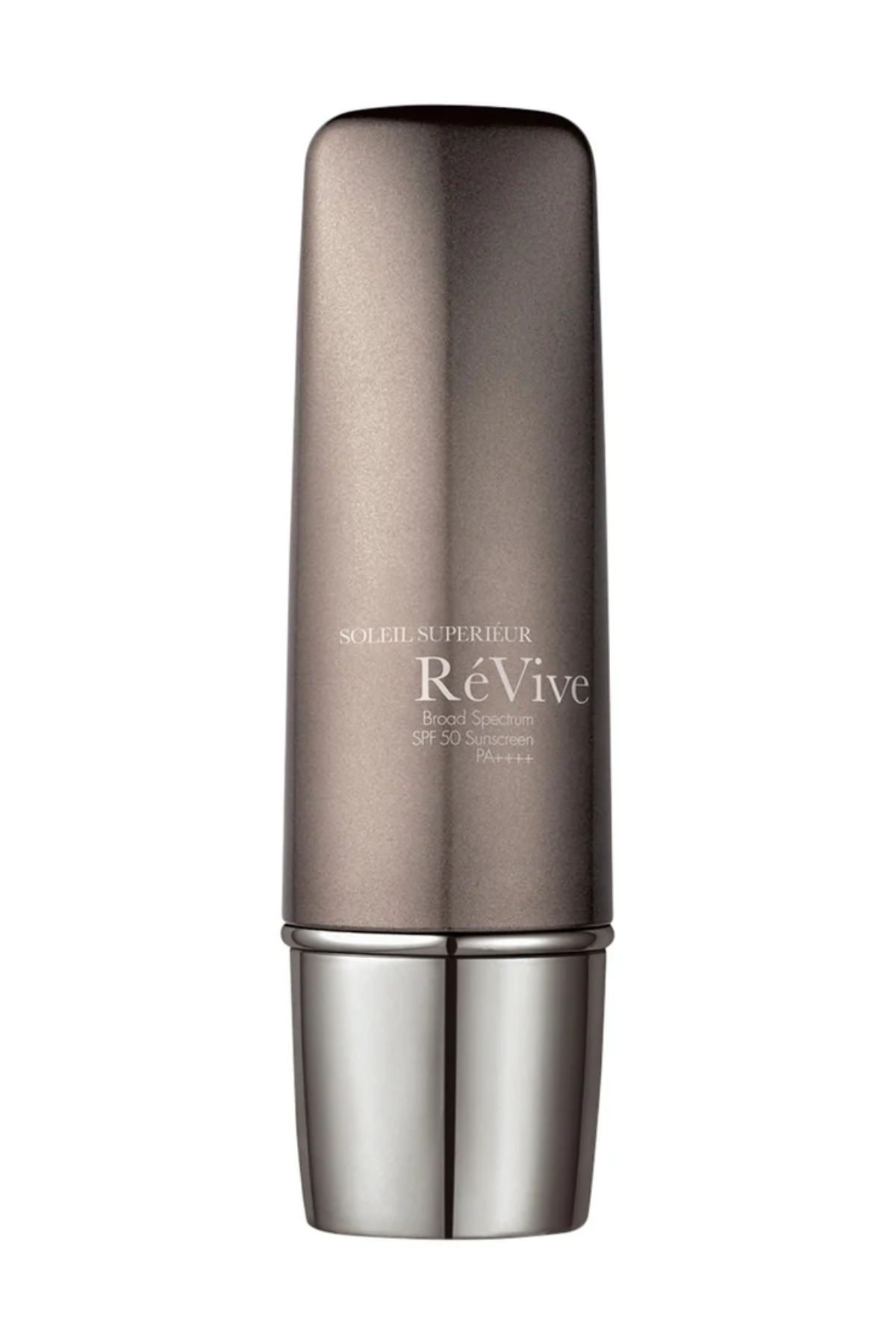
If you’re looking for a multi-purpose protector that prevents burns and provides other skin benefits, this splurge-worthy option is the way to go. With an intense antioxidant complex, the comfortable formula wards off free radicals to keep skin youthful. We also love the luxe packaging and how it disappears into your skin, making it perfect to wear under makeup.
SPF: 50
Type: Chemical sunscreen
Active Ingredients: Avobenzone, homosalate, octisalate, octocrylene
Water Resistant: Yes, up to 80 minutes
Size: 5 oz.
Pros: Lack of fragrance makes it great for sensitive skin; Lightweight and comfortable formula; Easy to apply; Non-comedogenic; Recommended by the Skin Cancer Foundation
Cons: None found
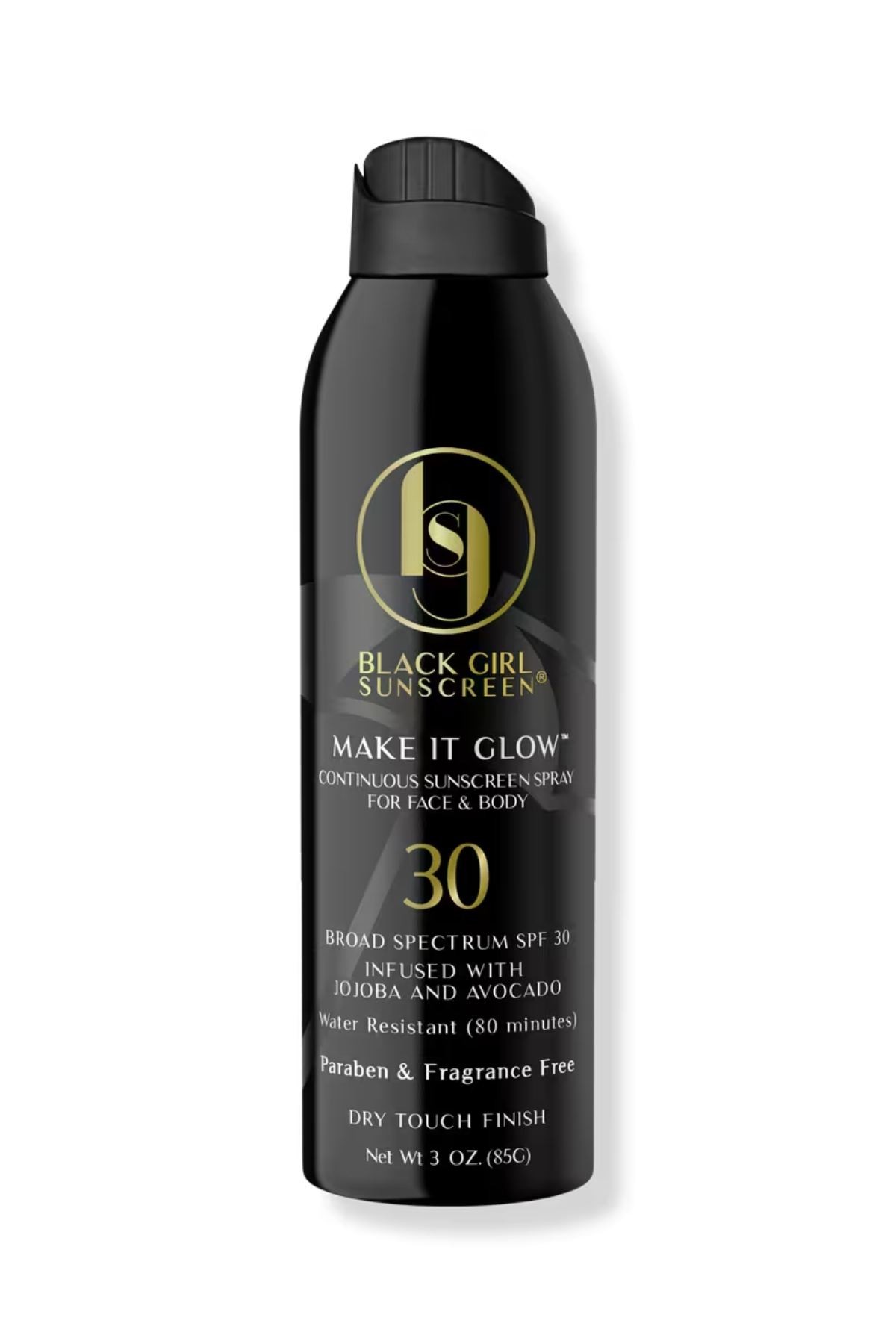
If you have dark skin and a lingering white cast is your biggest pain point, scoop up this SPF ASAP. It’s completely invisible and has a top-notch formula to boot. Thanks to jojoba and avocado, it's also extremely moisturizing and dries down in no time (from personal experience, we’re talking five seconds flat).
SPF: 30
Type: Chemical sunscreen
Active Ingredients: Avobenzone, homosalate, octisalate, octocrylene
Water Resistant: Yes, up to 80 minutes
Size: 3 oz.
Pros: Absolutely no white cast; Easy to apply; Moisturizing formula; Dries down easily; Fragrance free
Cons: SPF could be higher; Not water resistant
What to Look For in a Body Sunscreen
- SPF Rating
"The most important thing to look for is a broad spectrum sunscreen with a sun protection factor (SPF) of 30 or greater," explains Dr. Ryan Turner, a board-certified NYC dermatologist and co-founder of Trnr Skin. "Broad spectrum means that the formula will help protect your skin from both UVA and UVB rays. SPF 30 is the minimum recommended by all dermatologists and the AAD; an SPF 30 formula will block about 97 percent of UV rays. SPF 50 will block about 98 percent of the sun’s rays."
Still, it's worth noting that no SPF can block 100 percent of UV. Thus, you need to be diligent with application. "I always recommend 50+ SPF because we do not wear makeup as sunscreen on the body or reapply it as often as we should," adds Dr. Lee.
- Format
Chemical or mineral? Spray or oil? That's for you to decide. As Dr. Turner says, there are so many different formats to choose from, so all that really matters is that you like your choice enough to use it and reapply regularly.
"So long as you’ve checked those two boxes (broad spectrum and SPF 30+), your choice of sunscreen comes down entirely to preference," explains the dermatologist. "Those with sensitive skin frequently prefer mineral sunscreens as they tend to be gentler and non-irritating; chemical sunscreen formulas are often selected by those with sensitive skin or redness-prone skin or by those who don’t want to risk experiencing a chalky or ghostly cast on their skin when applying SPF."
- Water Resistance
If you plan on getting in water or playing a sport, you'll need a sunscreen that can handle the waves and sweat. Just remember that your water resistant sunscreen will need to be reapplied more frequently than the recommended every two hours.
Do I Really Need Body Sunscreen?
In short—yes. While applying sunscreen to your body certainly has long-term cosmetic benefits, it’s also the best defense for preventing skin cancer, which most frequently pops up on the body. “Melanoma is most commonly diagnosed in women on the legs and the trunk in men,” explains Dr. Finney. “Other skin cancers are more commonly diagnosed in areas of chronic sun exposure, like the head, neck, tops of the hands, and forearms.”
Body sunscreen is also helpful for people concerned about "hyperpigmentation, uneven pigment, or other signs of chronic sun damage, such as wrinkly or crepey skin," Dr Finney says.
Is a Spray or Cream Sunscreen Better?
The best sunscreen is the one you’ll wear. That said, applying a consistent amount with cream is easier than a spray formula. Dr. Finney explains that while spray sunscreens can be just as effective, getting an even, all-over application is a bit trickier. “Make sure you shake the bottle enough, keep it no more than six inches away from your body, and spray evenly,” he advises. “Make sure to let it dry before sweating, swimming, or putting clothing on.”
What's The Difference Between Face and Body Sunscreen?
First things first: If you're in a pinch and only have face sunscreen, you should apply it to the rest of your body. As Dr. Turner advises, "Body sunscreens usually feature richer or oilier textures than facial sunscreens. It’s generally recommended to use separate formulas for face and body as a heavy body SPF could cause breakouts if used on the face, but it is absolutely better to use the 'wrong' sunscreen than to wear no sunscreen at all."
How We Tested

The best body sunscreen testing setting. UV index: 11.
While rigorous testing is always the way at Marie Claire, it just so happened that freelance beauty writer Sophia Vilensky had a late-June camping trip to the Californian desert planned, followed by a Vegas trip and then a couple of days at a lake in Minnesota. Each sunscreen had its (literal) day in the sun, with timed full-body reapplications to seal the deal. At the end of the weeks-long testing period, there were no sunburns or slight rosiness.
Meet the Experts

Originally from Pittsburgh, PA, Dr. Finney completed his undergraduate and medical degrees at Pennsylvania State University. He completed his internship and dermatology residency at Thomas Jefferson University Hospital in Philadelphia, PA where he served as chief resident during his final year. He also performed a postdoctoral research fellowship in eczema and allergic contact dermatitis at Rockefeller University in addition to an advanced fellowship in aesthetics, hair restoration, and skin surgery with renowned hair surgeon Dr. Marc Avram in New York. Dr. Finney is a clinical assistant professor at New York University Langone and teaches future dermatologists at Bellevue Hospital. Dr. Finney is an expert in medical, surgical, and cosmetic dermatology and is regularly asked to contribute to various media outlets, including Men’s Health, Men’s Journal, Esquire, and Women’s Health. He does not approach aesthetics from a cookie-cutter approach, rather he works closely with each patient to design a customized treatment regimen to achieve his or her desired aesthetic outcomes that appear natural and refreshed, never over-done.
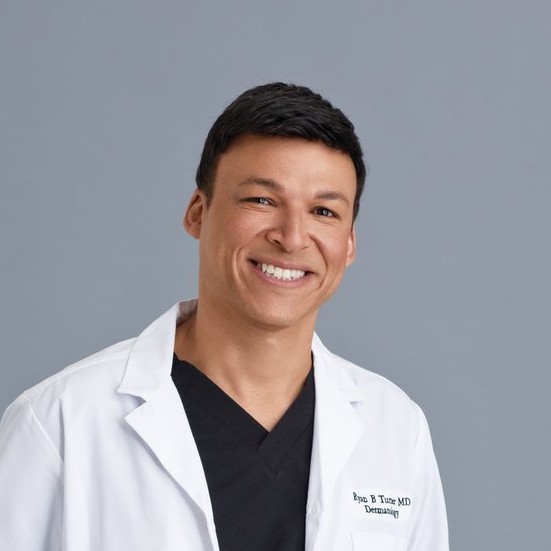
Dr. Ryan B. Turner, a board-certified dermatologist in New York City who practices cosmetic dermatology, general dermatology, surgical dermatology, and laser surgery. He uses the latest scientific research to guide his approach to the management of numerous dermatologic concerns.
He has been named repeatedly as a New York Rising Star in the publication of the New York Times Magazine Super Doctors edition. He has recently been featured in publications which include Bustle, GQ, Allure, Byrdie, and Vanity Fair.
Dr. Turner graduated summa cum laude and valedictorian of the University of Maryland Baltimore County. He received his Doctor of Medicine with honors from Harvard Medical School receiving the Henry Asbury Christian Award for his research accomplishments. He completed his internship in medicine and his dermatology residency at the Harvard-affiliated Brigham and Women’s Hospital and the Massachusetts General Hospital, respectively. He has also completed an ACGME-accredited fellowship in Procedural Dermatology at the Mount Sinai Medical Center in New York.
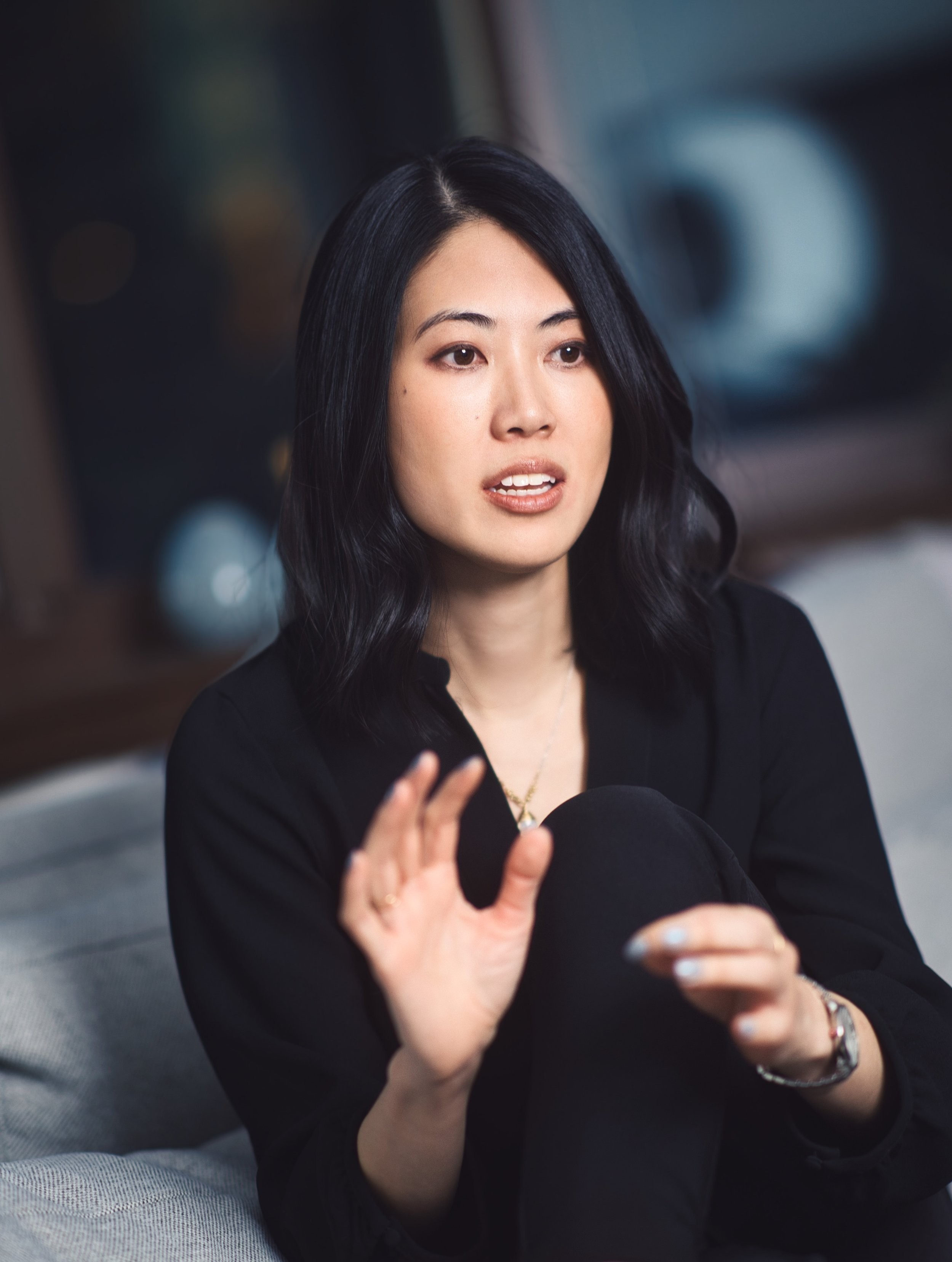
Dr. Nicole Y Lee is a board-certified dermatologist with advanced fellowship training in cosmetic and procedural dermatology. She completed her undergraduate at Georgetown University and then pursued her Doctorate in Medicine at the University of North Carolina in Chapel Hill, where she also obtained a Master of Public Health degree. Upon completing her medical education, Dr. Lee returned to Georgetown University for her internship in internal medicine, followed by her dermatology residency at the University of Alabama in Birmingham where she served as chief resident in her final year.
Get exclusive access to fashion and beauty trends, hot-off-the-press celebrity news, and more.
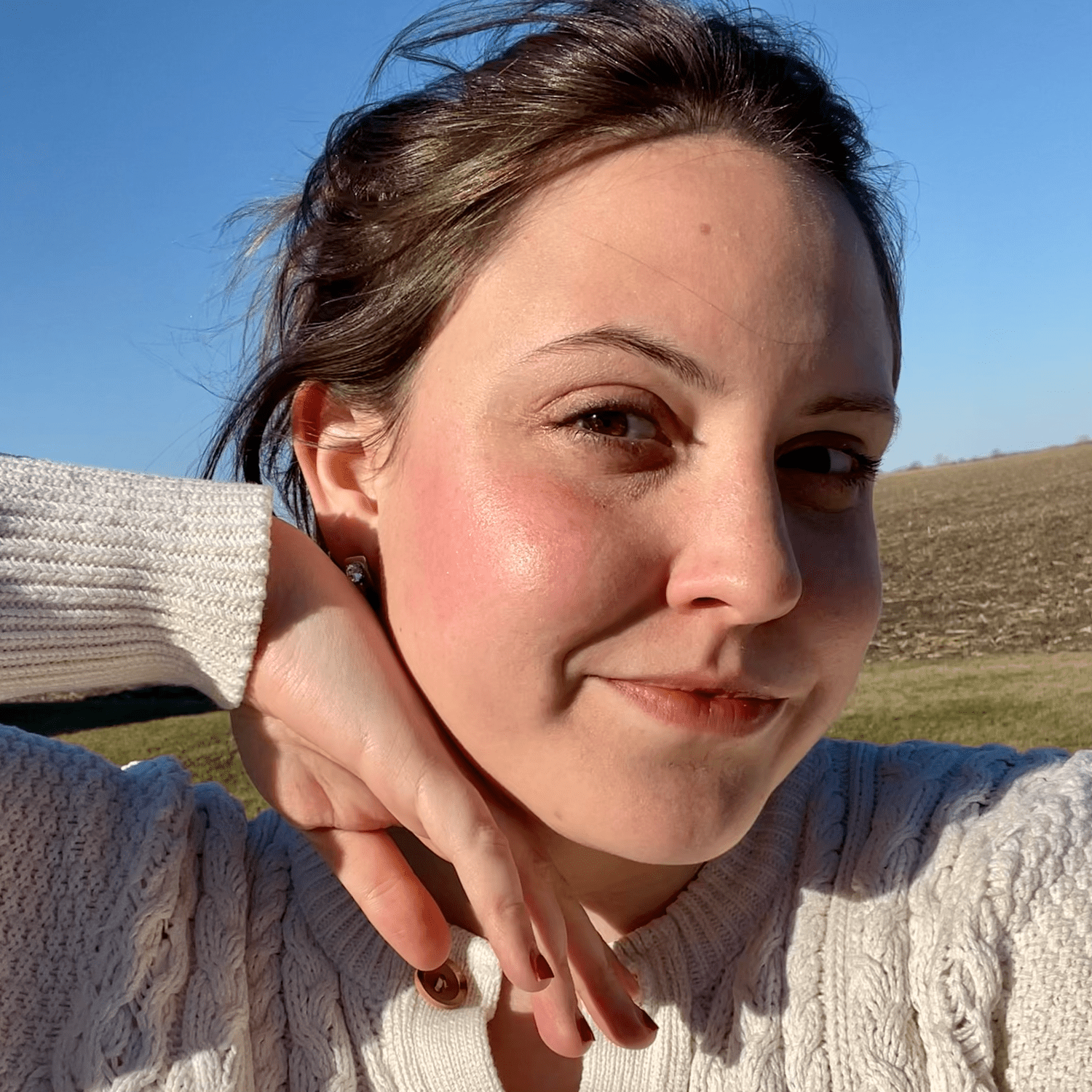
Sophia Vilensky is a Freelance Beauty Writer at Marie Claire with a beauty, wellness, and entertainment journalism portfolio that includes contributions to Byrdie, Bravo, Teen Vogue, and Us Weekly. Growing up in a family of beauticians—and through her own personal studies—she developed an in-depth understanding of aesthetics, cosmetic product formulation, and beauty treatment development and has also held roles as a senior copywriter, content strategist, and proofreader for top beauty and wellness brands. Even so, you'd be hard pressed to find her with her hair and makeup actually done. Sophia is based in Minneapolis and is a 2019 graduate of the University of Minnesota, where she majored in English and minored in cinema studies. During her time at the university, she was the Arts & Entertainment Editor for the Minnesota Daily, earning the 2019 Editor of the Year award for her work. She connected deeply with the Twin Cities arts scene, collaborating with leading beauty professionals, designers, and artists. Graduating Summa Cum Laude, her thesis—a close-reading of Vanderpump Rules—was featured on NPR. When not immersed in writing or testing new products, Sophia enjoys watching reality TV, reading, and exploring the newest woo-woo wellness trends. Keep up with her on Instagram @sophiavilensky.